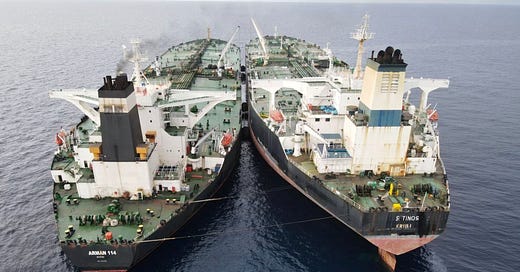SK sanctions for NK ICBM test; Indonesia seizes Iranian-flagged tanker; Iraq to trade oil for Iranian gas
Prohibited Transactions for the week of 10 July 2023 (#12)
North Korea
In response to the recent North Korean test firing of a Hwasong-18 solid-fuel intercontinental ballistic missile (ICBM), South Korea sanctioned four DPRK officials and three North Korean entities involved in the funding and development of the missile. At the United Nations, the US government led calls for the UN Security Council to take actions against the DPRK’s recurring violations of Security Council Resolutions, but were stymied by Russia and the PRC. //Perhaps more US sanctions against the DPRK in the next few days?
Coal exports from North Korea to the PRC continue, as prices rise due to Chinese demand. Vessels are openly carrying out ship-to-ship (STS) transfers in Chinese waters.
North Korea is relying on freight train-based trade for importing goods, with foodstuffs making up 80 percent of the products in a recent shipment. Items include seasonings, clam soy sauce, chicken broth, dried fruits, baked goods, candy, seaweed, coffee, sweet corn and processed snack bars. As these goods aren’t usually found in North Korean markets, they are likely for distribution to the country’s elite. The shipment also included construction materials used for small-scale construction projects, as well as medical items. //Though these aren’t necessarily luxury goods, they are still meant to be used by the government to ensure regime stability by currying favor with the elites.
Iran
The Indonesian government seized an Iranian-flagged supertanker carrying 272,569 metric tons of light crude oil, valued at USD304 million. The supertanker — which was spoofing their automatic identification system (AIS) and appearing to be in the Red Sea — is accused of carrying out an illicit STS transfer with a Cameroon-flagged vessel in Indonesian waters. //There are so many different ways now for illicit actors to engage in vessel identity laundering or the above-mentioned AIS spoofing. Financial institutions must increase their awareness of these tactics and the associated red flags in order to avoid unwittingly processing transactions tied to these forms of sanctions evasion.
Pro-Iranian factions in Iraq are pushing for Baghdad to pressure Washington to ensure that Iraq’s USD2.7 billion payment for Iranian gas is cleared. Because Iran cannot access the funds, Tehran is still reducing the amount of gas going to Iraq. The two sides appear to have agreed to a workaround where Iraqi crude oil will be exchanged for Iranian gas, which is used to fuel Iraqi power plants. //Is it that Iran can’t access the funds at all at the Iraqi bank, or that they need to exchange the funds from Iraqi dinars to US dollars? As mentioned in Issue #11, the latter could require a license from the US. Though, isn’t it in Washington’s interest to release the funds, as they are supposed to be used for non-sanctioned goods? Now with this workaround, Tehran will receive Iraqi crude which it can sell and do whatever with the money they earn.
Iran is one of the world’s top producers of bitumen, producing 5.5 million tons per year, of which four million tons are provided free of charge to Iranian state-owned entities and affiliates of the Islamic Revolutionary Guard Corps (IRGC). However, according to Iranian media, approximately 2.5 million tons — worth an estimated USD1 billion — is illicitly exported out of the country, to the financial benefit of IRGC-linked middlemen.
The PRC will likely continue to deepen its multifaceted trade with Iran in the upcoming year, but without a revival of the Joint Comprehensive Plan of Action (JCPOA) — or a similar agreement — Chinese companies may be too fearful of Western sanctions to engage in large economic projects between the two countries.
Iran has paid in full for a number of Russian Sukhoi Su-35 fighter jets, but has waited for over a year for delivery. It is unlikely the fighters will be turned over to Iran in 2023. //Seems like the relationship between the two nations isn’t as strong as Tehran would like it to be. Will be interesting to see if Iran’s recent entry into the Shanghai Cooperation Organization (which Russia is a member of) changes anything.
Researchers examining Iranian drones used in Ukraine by Russian forces discovered that some components which previously had to be purchased from overseas suppliers are now being produced domestically in Iran, which reduces the risk of the parts being subject to sanctions.
The US government charged a dual US-Israeli citizen for attempting to broker deals for Iranian oil between the Iranians and a Chinese energy company in 2015 and 2016.
These activities regarding Iranian oil are part of a broader set of charges directed against the dual citizen for acting on behalf of the PRC without registering as a foreign agent, weapons trafficking, and lying to US federal officials. //The Iranian oil activity is a notable, but minor part of the overall indictment.



